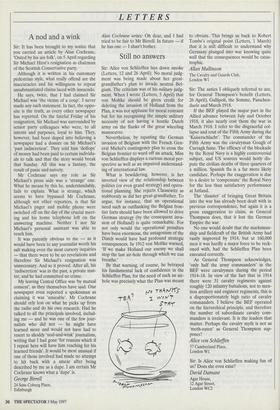Still no answers
Sir: Alice von Schlieffen lays down smoke (Letters, 12 and 26 April). No moral judg- ment was being made about her great- grandfather's plan to invade neutral Bel- gium. The criticism was of his military judg- ment. When I wrote (Letters, 5 April) that von Moltke should be given credit for deleting the invasion of Holland from the Plan, it was not applause for moral restraint but for his recognising the simple military necessity of not having a hostile Dutch army on the flanks of the great wheeling manoeuvre.
Nevertheless, by equating the German invasion of Belgium with the French Gen- eral Michel's contingency plan to cross the Belgian frontier to ward off an attack, Miss von Schlieffen displays a curious moral per- spective as well as an impaired understand- ing of international law. What is bewildering, however, is her inverted view of the relationship between politics (or even grand strategy) and opera- tional planning. She rejects Clausewitz as stubbornly as did her great-grandfather. To argue, for instance, that an operational need such as outflanking the Belgian fron- tier forts should have been allowed to drive German strategy (by the consequent inva- sion of Holland) is quite remarkable. For not only would the operational penalties have been enormous, the antagonism of the Dutch would have had profound strategic consequences. In 1912 von Moltke warned, `If we make Holland our enemy we shall stop the last air-hole through which we can breathe.'
By that warning, of course, he betrayed his fundamental lack of confidence in the Schlieffen Plan, for the need of such an air- hole was precisely what the Plan was meant to obviate. This brings us back to Robert Tombs's original point (Letters, 1 March) that it is still difficult to understand why Germany plunged into war knowing quite well that the consequences would be catas- trophic.
Allan Mallinson
The Cavalry and Guards Club, London W1


































































 Previous page
Previous page